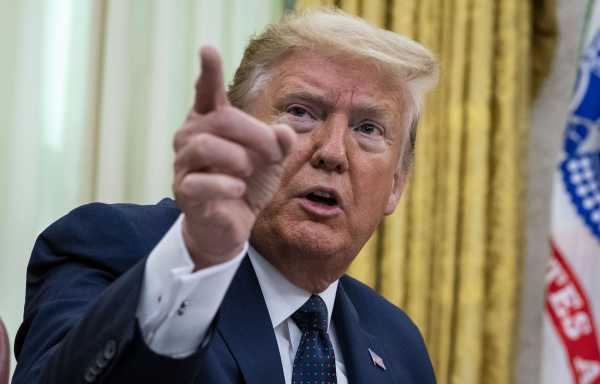
President Donald Trump signed a proclamation Monday temporarily blocking the entry of foreign workers coming to the US on certain visas — including the sought-after H-1B visa for skilled workers — through the end of the year.
The proclamation is the latest in Trump’s series of crackdowns on legal immigration during the coronavirus pandemic. The move, which will affect hundreds of thousands of people who had planned to come to the US, is necessary, according to a senior administration official, because Americans face staggeringly high unemployment levels as a result of the pandemic.
The proclamation, which will go into effect at 12:01 am ET on June 24, will prevent foreigners from coming to the US through a variety of visa categories, including H-1B visas, which the tech industry has come to rely on, as well as the H-4 visa for H-1B recipients’ spouses. It would similarly restrict foreigners transferring to the US offices of their multinational companies through L visas, including business executives; some scholars and people participating in cultural and work exchanges on J-1 visas; and temporary workers in nonagricultural industries on H-2B visas.
“Under ordinary circumstances, properly administered temporary worker programs can provide benefits to the economy,” Trump wrote in the proclamation. “But under the extraordinary circumstances of the economic contraction resulting from the COVID-19 outbreak, certain visa programs authorizing such employment pose an unusual threat to the employment of American workers.”
There are a few key exceptions to the proclamation: It does not affect immigrants who are already in the US, existing visa holders, temporary workers in food production industries, and health care workers and researchers fighting Covid-19. But the restrictions would still impact hundreds of thousands of immigrants.
Still, the proclamation might not immediately shift the status quo since many US consulates, which process visa applications for foreigners overseas, remain closed due to the pandemic. The closures have caused visa issuances to drop precipitously in recent months.
The pandemic has given Trump long-sought opportunities to implement restrictions on legal immigration. He has already effectively shut down asylum processing on the southern border and temporarily barred the issuance of new green cards for 60 days. He will extend that ban on green cards through the end of the year, the official said Monday.
The official said that the latest proclamation would open up roughly 525,000 jobs for Americans. But it’s not clear that companies will be able to fill those jobs with American workers with the necessary skills and experience. Many employers would face challenges filling positions requiring specialized skills, particularly in STEM fields where there are well-documented labor shortages that help drive economic expansion and create jobs for native-born workers.
The proclamation could therefore create uncertainty for employers who are facing a legitimate gap in their workforce, as well as the Americans they employ.
“This order is economically baseless,” David Bier, an immigration policy analyst for the libertarian Cato Institute, said in a statement. “It will hurt the recovery and U.S. workers. Foreign workers create demand for other better jobs for U.S. workers elsewhere in the economy. Restricting migration will not lower unemployment, but it will harm American businesses — that are struggling to make it through this period — who employ both Americans and immigrants.”
Additional regulatory changes to legal immigration
The Trump administration is also weighing a slew of additional changes to legal immigration via regulation.
The official said the administration is finalizing a rule that would deny work permits to asylum seekers who cross the US border without authorization. For asylum seekers who cannot afford to be unemployed and are not eligible for most public benefits, that means they would need to either give up their asylum claims in the US altogether or find under-the-table jobs in the shadow economy.
Trump is also planning to eliminate work permits for people who have been ordered deported or who have committed crimes in the US, which encompasses roughly 50,000 people per year, the official said.
Trump is pursuing reforms to the H-1B visa program, in which demand consistently outstrips the supply of visas. More than 85,000 immigrants get H-1B visas for skilled workers annually, including more than 1,000 apiece for workers at tech giants such as Google and Amazon. Recipients are currently selected by lottery, but Trump is proposing to instead prioritize workers with the highest wages and raise the program’s minimum wage requirements.
He is also proposing to bar the issuance of H-1Bs to outsourcing firms that bring in employees, primarily from India, on these visas to fill IT positions — at times displacing American workers — a practice that lawmakers in both parties agree should be prohibited through reforms. The largest of these firms, Tata Consultancy Services and Infosys, consistently receive more H-1Bs than even the largest US tech companies.
These regulatory changes, however, could take months, if not years, to implement. And Trump may not have time to carry out those changes if former Vice President Joe Biden, the presumptive Democratic nominee, wins the presidential election this fall.
The fraught debate over H-1Bs and why suspending them won’t help economic recovery
The H-1B program is a pipeline for foreign talent, particularly in the fields of computer science, engineering, education, and medicine. The program has its flaws, but shutting it down likely won’t help the vast majority of job-seeking Americans during this crisis.
The application process for H-1B visas is expensive, costing about $10,000 per worker, usually paid by an employer. But without these visas, many companies argue they would face difficulty filling jobs that require specialized skills or degrees. The business community has consequently in recent years lobbied Congress to increase the cap on H-1B visas.
While many businesses are facing a legitimate gap in their workforce and pay their skilled foreign workers a fair wage, some employers have used H-1Bs to fill positions cheaply — sometimes at the expense of American workers.
Federal guidelines say the H-1B program should not “adversely affect the wages and working conditions” of Americans. The question of whether H-1B workers are generally underpaid and drive down American wages has proved difficult to answer, spurring disagreement among researchers. But it’s clear that employers have, in fact, been able to use the H-1B program to displace Americans.
Most employers aren’t required to show that they have advertised a job to Americans and that there are no qualified Americans available to fill the position before hiring an H-1B worker. That has allowed companies ranging from Disney to the electric utility Southern California Edison to the coronavirus antibody test producer Abbott Labs to lay off US workers and replace them with H-1B workers with lower salaries — in some cases, even ordering the US workers to train their replacements.
Even so, experts say that amending the program to ensure foreign workers don’t displace Americans is preferable to ending it. Lawmakers in both parties have sought such reforms to the H-1B program for more than a decade, including Sens. Dick Durbin and Chuck Grassley. Their latest bill mirrors much of the regulatory changes to the H-1B program that Trump is proposing, clamping down on outsourcing companies that rely on H-1Bs, ensuring that companies have to look for qualified American candidates before hiring H-1B workers, and prioritizing high earners.
Support Vox’s explanatory journalism
Every day at Vox, we aim to answer your most important questions and provide you, and our audience around the world, with information that has the power to save lives. Our mission has never been more vital than it is in this moment: to empower you through understanding. Vox’s work is reaching more people than ever, but our distinctive brand of explanatory journalism takes resources — particularly during a pandemic and an economic downturn. Your financial contribution will not constitute a donation, but it will enable our staff to continue to offer free articles, videos, and podcasts at the quality and volume that this moment requires. Please consider making a contribution to Vox today.
Sourse: vox.com






